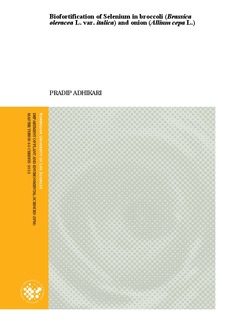Biofortification of Selenium in broccoli (Brassica oleracea L. var. italica) and onion (Allium cepa L.)
Master thesis
Permanent lenke
http://hdl.handle.net/11250/189535Utgivelsesdato
2012-09-17Metadata
Vis full innførselSamlinger
- Master's theses (IPM) [204]
Sammendrag
Selenium (Se) is an essential trace element to animals and human. To increase the consumption of Se in the human, biofortification of Se is usually practiced which is the process of increasing the concentration of Se in the edible portion. The main aim of the study is to investigate the effect of biofortification of Se in onion and broccoli and to evaluate and compare the effect of Se in average yield, dry matter, ascorbic acid, total phenols, antioxidant, Se and S accumulation and accessibility of Se. Four treatments (control, 20 mg, 50 mg and 80 mg) of Se and three treatments (control, 20 mg and 50 mg) of Se were applied in broccoli and onion respectively. Sodium selenate was used as a source of Se. The three varieties Ironman, Lord and Marathon of broccoli and Summit, Hytec and Red Baron of onion were chosen for the experiment. The accumulation of Se concentration was increased with the increase in concentration of Se in the soil in both onion and broccoli without affecting the health related compounds. The accumulation of Se is higher in broccoli than in onion. In broccoli, the highest accumulation of Se concentration was 44.28µg g-1 in variety ‘Ironman’ when treated with 80 mg Se and the accumulation of Se in onion was in the range of 6.11 to 8.31 µg g-1 treated with 50 mg Se. The net accumulation of Se lied within the safe limit and thus safe for the consumption for human. The accessibility is higher in onion than in broccoli.
